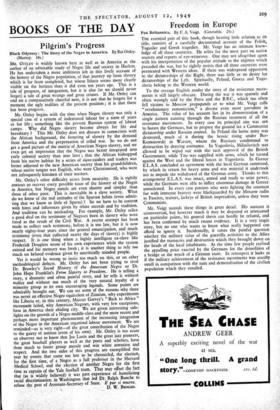BOOKS OF THE DAY
Pilgrim's Progress
Black Odyssey: The Story of the Negro in America. By Roi Oaks,. (Murray. 18s.)
Ma. Omit" is widely known here as well as in America as the author of an admirable study of Negro life and society in Harlem. He has undertaken a more ambitious job in this lively account of the history of the Negro population, of that journey up from slavery which is far from completed, but whose Ithaca seems more clearly visible on the horizon than it did even ten years ago. This is a tale of progress, of integration, but it is also (as we should never forget) a talc of great wrongs and great crimes. If Mr. Ottley can end on a comparatively cheerful note, it is not that he forgets for a moment the ugly realities of the present position ; it is that there has been progress.
Mr. Ottley begins with the time when Negro slavery was only a special case of a system of indentured labour for a term of years or for life something like the present Russian system of labour camps. Why did Negro slavery become always for life and hereditary ? This Mi. Ottley does not discuss in connection with the African background, the fostering of slavery by the demand from America and the perpetuation of tribal war. So we do not get a good picture of the matrix of American Negro slavery, and we even get an impression that the Negro was better integrated into early colonial society than into later ; that the African kidnapped from his native habitat by a series of slave-raiders and traders was better adjusted to the new American society than his grandchildren, whose native tongue was English, who were Christianised, who were not infrequently kinsmen of their masters.
Mr. Ottley's other difficulty arises from necessity. He is rightly anxious to recover every possible trace of the history of the Negro in America, but Negro annals are even shorter and simpler than those of other poor. This is inevitable in a slave society. What do we know of the real attitudes of the Spartan helots (even admit- ting that we know so little of Sparta) ? So we have to be content with hints and inferences given by white records and by tradition. And tradition can be misleading. For example, Mr. Ottley relies a good deal on the testimony of Negroes born in slavery who were freed as the result of the Civil War. A recent attempt has been made to collect such testimony, before it is too late, but it is now nearly eighty-four years since the general emancipation, and much testimony (even that collected nearer the days of slavery) is highly suspect. It is• one thing when a highly intelligent ex-slave like Frederick Douglass wrote of his own experiences while the system existed and his memory was fresh ; it is another thing to rely too much on belated evidence given by uncritically minded people.
Yet it would be wrong to insist too much on this, or on other methodological defects. Mr. Ottley has not been trying to rival Dr. Brawley's Social History of the American Negro or Dr. John Hope Franklin's From Slavery to Freedom. He is telling a story, a dramatic and often painful story, and he tells it without malice and without too much of the very natural loyalty of a minority group to its own encouraging legends. Some points are admirably brought out. We can see some of the reasons why there was never an effective Negro equivalent of Zionism, why experiments like Liberia or, in this century, Marcus Garvey's "Back to Africa" movement failed, why American Negroes, with very few exceptions, have in America their abiding city. We arc given interesting side- lights on the growth of a Negro middle-class and the more recent and perhaps more important phenomenon of the increasing integration of the Negro in the American organised labour movement. We are reminded—as is very right—of the great contribution of the Negro to the gaiety of nations (even of his own). Mr. Ottley is too acute an observer not to know that Joe Louis and the great jazz pioneers, the great baseball players as well as the poets and scholars, have done much to foster group morale and win white attention and respect. And the two sides of this progress arc exemplified this year by events that came too late to be chronicled, the election, for the first time, of a Negro as a full professor in the Harvard Medical School, and the election of another Negro for the first time as captain of the Yale football team. That may offset the fact that (as is widely believed) it was past experience of humiliating racial discrimination in Washington that led Dt. Ralph Bunche to refuse the post of Assistant-Secretary of State. E pur ti muove.
D. W. BROGAN.






























 Previous page
Previous page